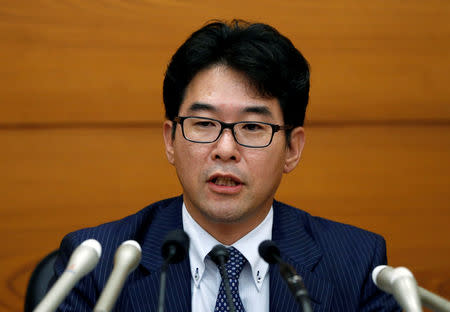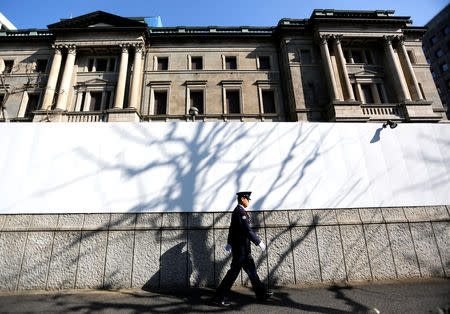Dissenter urges BOJ to ramp up stimulus to hit price goal early
By Leika Kihara
TAKAMATSU, Japan (Reuters) - Bank of Japan board member Goushi Kataoka said on Wednesday the central bank must ramp up monetary stimulus to achieve its inflation target and warned maintaining current policy settings for too long could cause major swings in economic growth.
Kataoka, a vocal advocate of aggressive easing, also said ultra-easy monetary policy must be accompanied by loose fiscal policy for inflation to hit the BOJ's elusive 2 percent target.
"While not impossible, it's hard to achieve the price target with monetary policy alone," Kataoka said, adding that fiscal and monetary policies "must be on the same page" to change public perceptions that deflation will persist.
"Even if monetary policy is loose, it would take a very long time to achieve our price target if fiscal policy is tight," Kataoka told a news conference after meeting with business leaders in Takamatsu, western Japan.
A consistent and lone dissenter to keeping monetary policy steady, Kataoka said the BOJ must take bolder steps to hit its price goal, so that it can exit ultra-easy policy before the costs exceed the merits.
"If the current monetary easing is prolonged, it would mean the period in which Japan's economy faces various uncertainties will be longer," he told a speech to the business leaders. "That means uncertainty on achieving our price target will heighten."
Kataoka repeated his calls for the BOJ to take measures to further push down long-term rates, and commit to topping up stimulus if inflation expectations weaken.
"It's hard to believe public trust in the BOJ's commitment to achieve its price target will heighten, when monetary policy is kept steady despite cuts in the BOJ board's price forecasts," he said.
BOLDER ACTION NEEDED
Kataoka's remarks run counter to those of BOJ Governor Haruhiko Kuroda, who has said "patiently" maintaining the current stimulus was the best way to meet the price target without destabilising the economy.
Speaking in Tokyo on Wednesday, Kuroda said inflation was unlikely to hit his 2 percent target in the fiscal year ending in March 2021.
That meant the BOJ should continue to buy exchange-traded funds (ETF) as part of its stimulus programme that combines huge asset buying with a zero-percent cap on long-term yields.
"When conditions fall in place for inflation to hit 2 percent, we will exit (from ultra-loose policy) and normalise monetary policy," Kuroda told parliament.
"It's likely to take more time to achieve our price target, so we're not at a stage to consider ending our ETF buying."
Under a policy dubbed yield curve control (YCC), the BOJ aims to guide short-term rates at minus 0.1 percent and 10-year government bond yields around zero percent. As part of this effort, it buys government bonds and risky assets such as ETFs.
The BOJ faces a dilemma. Years of heavy money printing have dried up market liquidity and hurt commercial banks' profits, stoking concern over the rising risks of prolonged easing.
And yet, subdued inflation has left the BOJ well behind its U.S. and European counterparts in dialling back its crisis-mode policies, leaving it with little ammunition to battle an abrupt yen spike that could derail an export-driven economic recovery.
Kataoka said he was aware of the pain financial institutions were feeling from years of ultra-low rates.
"I'm not saying we should ease more because we don't need to worry about the banks at all," he said. "What I'm saying is that in order to end deflation and normalise monetary policy quickly, we need to take bolder action now."
The BOJ cut its price forecasts at last month's rate review and now projects core consumer inflation to hit 1.4 percent in fiscal 2020, short of its 2 percent target.
Annual core consumer inflation was 0.8 percent in January.
(Reporting by Leika Kihara; Editing by Shri Navaratnam and Sam Holmes)

 Yahoo Finance
Yahoo Finance 

